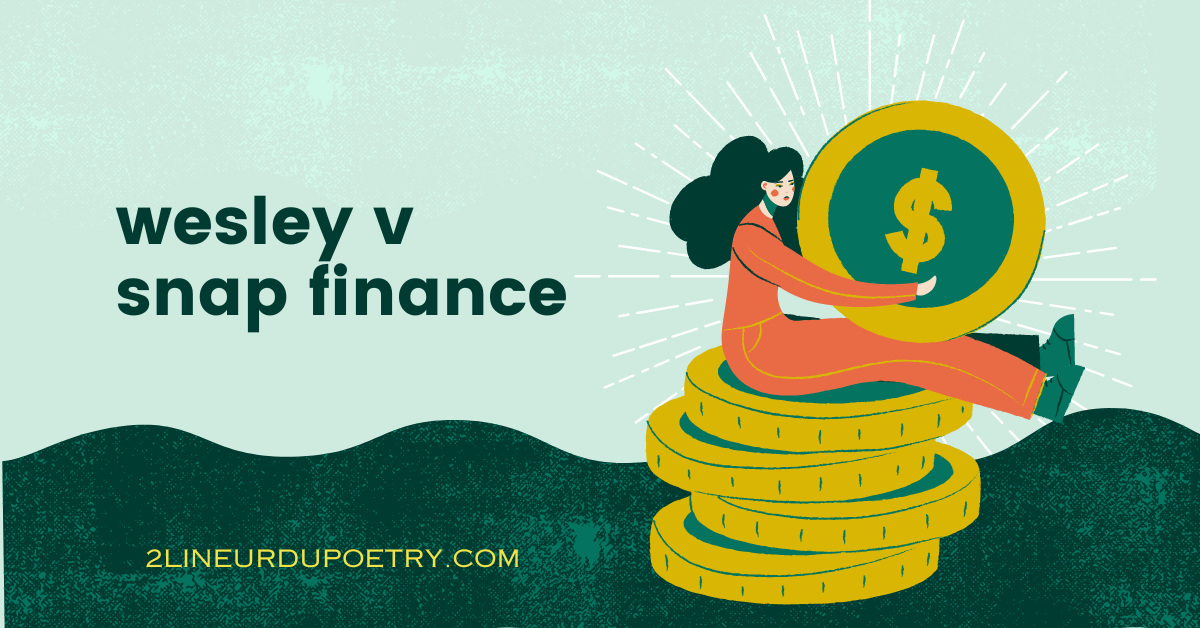Introduction to the legal battle between Wesley v snap finance
In the ever-evolving landscape of the consumer finance industry, legal battles often arise, shaping the way companies conduct their business and impacting consumer rights and protections. One such legal battle that has garnered significant attention is the case of Wesley v snap finance. This article aims to delve into the details of this lawsuit, providing an overview of both companies involved, the allegations against Snap Finance, the defense of Wesley, and the potential implications it holds for the consumer finance industry.
Overview of wesley v snap finance
Before we dive into the intricacies of the legal battle, let us first understand the two key players involved. Snap Finance is a well-established consumer finance company that offers fast and flexible financing options to individuals with limited credit history. On the other hand, Wesley is a prominent financial services provider known for its innovative lending solutions and commitment to serving consumers’ diverse needs. Both companies have a significant presence in the industry, making this legal battle all the more compelling.
The allegations against Snap Finance
In the lawsuit filed by Wesley against Snap Finance, several allegations have been put forth that question the business practices of the latter. Wesley claims that Snap Finance engages in predatory lending practices, targeting vulnerable consumers with high-interest rates and hidden fees. Moreover, they allege that Snap Finance fails to adequately disclose the terms and conditions of their loans, leading to financial distress for borrowers. These allegations have serious implications not only for Snap Finance but also for the wider consumer finance industry as a whole.
The defense of Wesley
While Snap Finance faces serious allegations in this legal battle, it is essential to consider the defense put forth by Wesley. Wesley contends that the claims made against Snap Finance are baseless and driven by their own competitive motives. They assert that their lending practices are transparent and fully compliant with industry regulations. Wesley argues that the accusations made by Snap Finance are an attempt to undermine their reputation and gain an unfair advantage in the market. As the legal battle unfolds, it will be interesting to see how these defenses hold up in court.
Implications of the legal battle on the consumer finance industry
The outcome of the Snap Finance vs. Wesley legal battle holds significant ramifications for the consumer finance industry. Firstly, it could lead to a reevaluation of the lending practices employed by companies within the industry. If the allegations against Snap Finance are proven true, it may prompt regulatory authorities to impose stricter guidelines to prevent predatory lending and protect consumers from financial exploitation. This, in turn, could lead to increased transparency, fairer interest rates, and improved borrower protections.
Impact on consumer rights and protections
Consumer rights and protections lie at the heart of this legal battle. If Snap Finance is found guilty of the alleged predatory lending practices, it would expose the vulnerabilities that consumers often face in the consumer finance industry. This case could serve as a wake-up call for regulators and policymakers, urging them to strengthen existing laws and regulations to safeguard consumer rights. Furthermore, it may encourage greater transparency and disclosure requirements for lenders, ensuring that borrowers are fully aware of the terms and conditions of their loans.
Changes in consumer finance industry regulations
Legal battles like the one between Snap Finance and Wesley have the potential to reshape the regulatory landscape of the consumer finance industry. If the allegations against Snap Finance are proven, it could lead to a tightening of regulations governing lending practices, particularly those targeting individuals with limited credit history. Regulators may introduce stricter guidelines to prevent predatory lending, such as capping interest rates and imposing clearer disclosure requirements. These changes would aim to foster a more equitable lending environment for consumers.
The role of legal battles in shaping industry practices
Legal battles within the consumer finance industry often serve as catalysts for change, influencing the way companies conduct their business. The outcome of the Snap Finance vs. Wesley case could set a precedent for future lawsuits and establish new standards for lending practices. Regardless of the final judgment, this legal battle will likely prompt both companies and industry players to reevaluate their practices, ensuring compliance with regulations and prioritizing consumer welfare. As such, legal battles play a crucial role in shaping the industry and driving positive changes.
Consumer reactions and perceptions
The legal battle between Snap Finance and Wesley has not gone unnoticed by consumers. Many individuals who have had experiences with either company or the broader consumer finance industry are closely following the developments of this case. The outcome of the lawsuit may influence consumer perceptions of both Snap Finance and Wesley, potentially affecting their reputations and customer bases. It is crucial for both companies to consider the impact of this legal battle on their relationship with consumers and take necessary measures to regain trust and confidence.
Conclusion
The legal battle between Snap Finance and Wesley has shed light on the inner workings of the consumer finance industry. With allegations of predatory lending practices and the defense of transparent lending, this case has far-reaching implications. It may lead to changes in industry regulations, improved consumer rights and protections, and a reevaluation of business practices. As consumers and industry players watch this legal battle unfold, it serves as a reminder of the importance of responsible lending and the need for a fair and equitable consumer finance industry.
